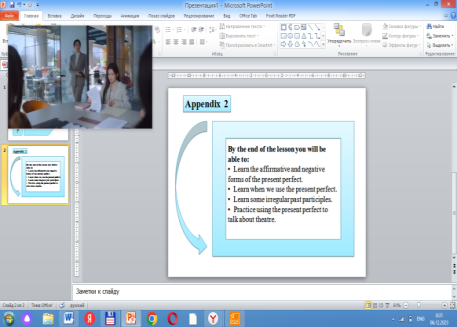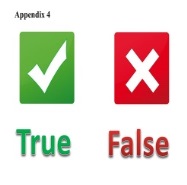
|
Unit of a long term plan: |
Drama and comedy |
School: T.Ryskulov |
|||||||||||||||||||||||||||||||||||||||||||||||||||||||||||||||||||||||||||||||||||||||||||||||||||||||||||||||||||||||||||||||||||||||||||||||||||||||||||||||||||||||||||||||||||||
|
Date: |
|
Teacher’s name: Kozybagarova Gaisha Dzhumabaevna |
|||||||||||||||||||||||||||||||||||||||||||||||||||||||||||||||||||||||||||||||||||||||||||||||||||||||||||||||||||||||||||||||||||||||||||||||||||||||||||||||||||||||||||||||||||||
|
Grade: |
6 |
Absent: 0 |
|||||||||||||||||||||||||||||||||||||||||||||||||||||||||||||||||||||||||||||||||||||||||||||||||||||||||||||||||||||||||||||||||||||||||||||||||||||||||||||||||||||||||||||||||||||
|
Lesson title: |
Have you ever been to the theatre? Perfect Forms |
||||||||||||||||||||||||||||||||||||||||||||||||||||||||||||||||||||||||||||||||||||||||||||||||||||||||||||||||||||||||||||||||||||||||||||||||||||||||||||||||||||||||||||||||||||||
|
Learning objectives |
6.1.2.1- use speaking and listening skills to provide sensitive feedback to peers; 6.4.2.1 understand independently specific information and detail in short, simple texts on a limited range of general and curricular topics; 6.5.2.1 write with some support about real and imaginary past events, activities and experiences on a limited range of familiar general topics and some curricular topics; |
||||||||||||||||||||||||||||||||||||||||||||||||||||||||||||||||||||||||||||||||||||||||||||||||||||||||||||||||||||||||||||||||||||||||||||||||||||||||||||||||||||||||||||||||||||||
|
Lesson objectives |
Students will be able to: • Learn the affirmative and negative forms of the present perfect. • Learn when we use the present perfect. • Learn some irregular past participles. • Practice using the present perfect to talk about theatre. |
||||||||||||||||||||||||||||||||||||||||||||||||||||||||||||||||||||||||||||||||||||||||||||||||||||||||||||||||||||||||||||||||||||||||||||||||||||||||||||||||||||||||||||||||||||||
|
Level of thinking skills |
Understanding and Application |
||||||||||||||||||||||||||||||||||||||||||||||||||||||||||||||||||||||||||||||||||||||||||||||||||||||||||||||||||||||||||||||||||||||||||||||||||||||||||||||||||||||||||||||||||||||
|
Lesson structure |
|||||||||||||||||||||||||||||||||||||||||||||||||||||||||||||||||||||||||||||||||||||||||||||||||||||||||||||||||||||||||||||||||||||||||||||||||||||||||||||||||||||||||||||||||||||||
|
Stages / Time |
Teacher’s actions |
Student’s actions |
Assessment |
Resources |
|||||||||||||||||||||||||||||||||||||||||||||||||||||||||||||||||||||||||||||||||||||||||||||||||||||||||||||||||||||||||||||||||||||||||||||||||||||||||||||||||||||||||||||||||||
|
Beginning (7 min) |
Teacher greets students and sets positive atmosphere Warm up: “BRAINSTORMING” (W)
Check homework. “Broken phone” game |
Students greet the teacher and answers her questions: The aim: To develop Ss speaking skills and create friendly atmosphere Efficiency: By reading the wishes they show their appreciations |
Assessment through observation Descriptor: *write words correctly -1p |
Whiteboard
PPT slide
|
|||||||||||||||||||||||||||||||||||||||||||||||||||||||||||||||||||||||||||||||||||||||||||||||||||||||||||||||||||||||||||||||||||||||||||||||||||||||||||||||||||||||||||||||||||
|
|
Pre-listening activity– “Decode” (W) The students work together to make sense of the numbers and guess what the task will be about. Teacher gives instructions to the task:
Have you ever been to the theatre? Perfect Forms
Teacher presents the objectives and outcomes of the lesson. -We are going prolong speaking about theatre and Perfect Forms. By the end of the lesson you will be able to: • Learn the affirmative and negative forms of the present perfect. • Learn when we use the present perfect. • Learn some irregular past participles. • Practice using the present perfect to talk about theatre. |
Students listen to and watch lesson objectives presented on the slide. Students try to guess the theme of the lesson. |
Descriptor: *decode the sentence-1p |
Worksheet
|
|||||||||||||||||||||||||||||||||||||||||||||||||||||||||||||||||||||||||||||||||||||||||||||||||||||||||||||||||||||||||||||||||||||||||||||||||||||||||||||||||||||||||||||||||||
|
Middle (30 min) |
Read the text and match these halves (P)
|
Learners match the halves on worksheet |
Descriptor: *read carefully-1p *match them correctly-1p Peer-assessment Students check other pair sheet according to keys. They count correct answers and write points on the sheet and exchange them back for revision. |
Worksheet
|
|||||||||||||||||||||||||||||||||||||||||||||||||||||||||||||||||||||||||||||||||||||||||||||||||||||||||||||||||||||||||||||||||||||||||||||||||||||||||||||||||||||||||||||||||||
|
While-listening activity–“True/False statements” (I) Read the text and using information from it, tick one box in each row to show whether each statement is True or False.
Differentiation by prompt: Teacher provides with hints in which paragraph the answer can be found.
|
Students follow the instructions and tick the correct box in each row.
|
Descriptor: *ticks all correctly-1p
Formative assessment technique: T and F cards: teacher checks learners’ answers while they show their cards. Assessment criteria: Identify complex personal questions with support |
Worksheet
|
||||||||||||||||||||||||||||||||||||||||||||||||||||||||||||||||||||||||||||||||||||||||||||||||||||||||||||||||||||||||||||||||||||||||||||||||||||||||||||||||||||||||||||||||||||
|
Post-listening
activity–“
Differentiation by support: The less able students will work with the translations of some topical vocabulary |
Students follow the instructions and answer the questions
|
Descriptor: *know Present Perfect-1p *distinguish between already/yet-1p
Self-assessment: Teacher opens slide with the answers. Learners check their answers, and show how many mistakes they made. |
PPT |
||||||||||||||||||||||||||||||||||||||||||||||||||||||||||||||||||||||||||||||||||||||||||||||||||||||||||||||||||||||||||||||||||||||||||||||||||||||||||||||||||||||||||||||||||||
|
|
Writing“A”cy Pronunciation Writing Wwwww-Dialogue type -“Find Somebody Who…” activity (P) Read and answer the questions. Use a vocabulary and tell about classmate.Differentiation by dialogue: The less able student may well require a detailed explanation in simple language. The more able pupil requires a verbal dialogue at a more sophisticated level. All students need appropriate feedback within the dialogue.
|
Students ask their classmates present perfect questions and complete the table. For example, ‘Have you been to another country?’
|
Descriptor: *ask questions-1p *complete the table-1p Бұл материал сайт қолданушысы жариялаған. Материалдың ішінде жазылған барлық ақпаратқа жауапкершілікті жариялаған қолданушы жауап береді. Ұстаз тілегі тек ақпаратты таратуға қолдау көрсетеді. Егер материал сіздің авторлық құқығыңызды бұзған болса немесе басқа да себептермен сайттан өшіру керек деп ойласаңыз осында жазыңыз
Unit of a long term
plan:
Drama and
comedy
School: T.Ryskulov
Date:
Teacher’s
name: Kozybagarova Gaisha
Dzhumabaevna
Grade:
6
Absent: 0
Lesson
title:
Have you ever been to the
theatre? Perfect
Forms
Learning
objectives 6.1.2.1- use speaking and listening
skills to provide sensitive feedback to
peers; 6.4.2.1 understand
independently specific information and detail in short, simple
texts on a limited range of general and curricular
topics;
6.5.2.1 write with some
support about real and imaginary past events, activities and
experiences on a limited range of familiar general topics and some
curricular topics;
Lesson
objectives
Students will be able
to: • Learn the affirmative and
negative forms of the present
perfect. •
Learn when we use the present
perfect. •
Learn some irregular past
participles.
• Practice using the present
perfect to talk about theatre.
Level of thinking
skills
Understanding and
Application
Lesson
structure
Stages / Time
Teacher’s actions
Student’s actions
Assessment
Resources Beginning
(7
min) Teacher greets students and
sets positive atmosphere Warm up: “BRAINSTORMING”
(W)
Check homework. “Broken phone”
game Students greet the teacher and
answers her questions:
The aim:
To develop Ss speaking
skills and create friendly atmosphere
Efficiency: By reading the wishes they show their
appreciations Assessment through
observation Descriptor:
*write words
correctly -1p
Whiteboard
PPT slide
Pre-listening
activity–
“Decode” (W) The students work together to
make sense of the numbers and guess what the task will be
about. Teacher gives instructions to
the task:
Have you ever been to the
theatre? Perfect
Forms
Teacher presents the
objectives and outcomes of the
lesson. -We are going prolong speaking
about theatre
and Perfect
Forms. By the end of the lesson
you will be able to: • Learn the affirmative and
negative forms of the present
perfect. •
Learn when we use the present
perfect. •
Learn some irregular past
participles. •
Practice using the present
perfect to talk about theatre. Students listen to and watch
lesson objectives presented on the
slide. Students try to guess the
theme of the lesson. Descriptor: *decode the
sentence-1p Worksheet
Middle (30 min) Read the text
and match these halves
(P)
1. The
English famous theatres are mostly
a. is a
building or area for dramatic performances
2. It is
considered that the first meaning was borrowed from Greek
word
b. very
important for actors since the theatre appeared
3.
Theatre
c.
'théātron' which meant 'to view, to watch'
4. They
create
d. in the
14th century
5. The
audience's reaction and applause have been
e. 'place
for viewing dramatic performances'.
6. Later it
appeared in the Latin language with the meaning
f. a magical
theatrical atmosphere.
7. The word
'theatre' appeared in the English language
g.
theatre-goers or audience while watching
performances
8. Actors
and actresses are acting
h. on the
stage, presenting real life events
9. The
theatre has always had its own fans called
i. in
London
Learners match the halves on
worksheet Descriptor: *read
carefully-1p *match them
correctly-1p
Peer-assessment
Students check other pair
sheet according to keys. They count correct answers and write
points on the sheet and exchange them back for
revision.
Worksheet
While-listening
activity–“True/False
statements” (I)
Read the text and using
information from it, tick one box in each row to show whether each
statement is True or False. True False
1. The word 'theatre'
originated in the 14th century.
2. The word 'theatre'
was borrowed from the Greek word
'théātron'.
3. The first meaning of
'theatre' in Greek was 'to view, to
watch'.
4. The word 'theatre'
appeared in the Latin language with the meaning 'place for viewing
dramatic performances'.
5. The theatre is a
place where you can watch live performances based on
plays.
6. The actors and
actresses perform on the stage in the
theatre.
7. The audience's
reaction and applause are not important for
actors.
8. The Globe Theatre
and the Royal Opera House are famous English
theatres.
9. The Globe Theatre is
the oldest theatre in the world.
10. The Royal Opera
House is also known as Covent Garden.
Differentiation
by prompt:
Teacher provides with hints in
which paragraph the answer can be found.
Students follow the
instructions and tick the correct box in each
row.
Descriptor:
*ticks all
correctly-1p
Formative assessment
technique:
T and F
cards: teacher checks learners’
answers while they show their
cards. Assessment
criteria: Identify complex personal
questions with support
Worksheet
Post-listening
activity–“ Differentiation by
support: The less
able students will work with the
translations of some topical vocabulary
Students follow the
instructions and answer the
questions
Descriptor: *know Present
Perfect-1p *distinguish between
already/yet-1p
Self-assessment:
Teacher opens slide
with the answers. Learners check their answers, and show how many
mistakes they made.
PPT Writing“A”cy Pronunciation Writing
Wwwww-Dialogue type
-“Find Somebody
Who…” activity
(P)
Differentiation by
dialogue: The less able student may well require a
detailed explanation in simple language. The more able pupil
requires a verbal dialogue at a more sophisticated level. All
students need appropriate feedback within the
dialogue.
Students ask their classmates
present perfect questions and complete the table. For example,
‘Have you been to another country?’
Descriptor: *ask
questions-1p *complete the
table-1p | ||||||||||||||||||||||||||||||||||||||||||||||||||||||||||||||||||||||||||||||||||||||||||||||||||||||||||||||||||||||||||||||||||||||||||||||||||||||||||||||||||||||||||||||||||||





















